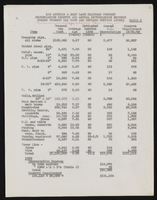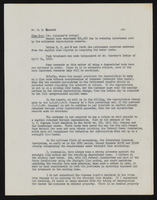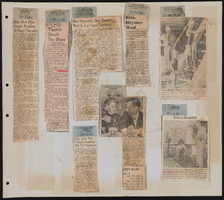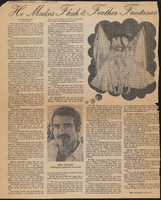Search the Special Collections and Archives Portal
Search Results
Sadie and Hampton George Papers
Identifier
Abstract
The Sadie and Hampton George Papers (1874-1948) consist primarily of the incoming and outgoing correspondence of Sadie Kiel George and her husband, Hampton George, regarding proposed land and mineral rights sales. The collection also includes some personal correspondence, and two of the most significant letters in the collection deal with the deaths of brothers William and Edward Kiel, Sadie's uncles, who were found dead at the Kiel Ranch in October 1900. Also included in the collection are receipts, cancelled checks, tax notices, mining claims, and land deeds.
Archival Collection
Tonopah, Nevada Mining Town Photograph Album
Identifier
Abstract
The Tonopah, Nevada Mining Town Photograph Album (approximately 1908) consists of twenty-two photographs in a leather-bound album. The photographs depict businesses, townspeople, street scenes, and mining operations in Tonopah, Nevada and the surrounding areas of Goldfield, Nevada and Mina, Nevada. Also included are photographs of a fire on May 12, 1908 that destroyed a block of commercial buildings in Tonopah, which were taken by local photographer E. W. Smith., and views of the downtown area both before and after the fire.
Archival Collection
William Hillman Shockley Photograph Collection
Identifier
Abstract
The William Hillman Shockley Photograph Collection (1875-1925, 1951) contains black-and-white photographs documenting mining operations at the Mount Diablo Mine and Millworks in Candelaria, Nevada. It also includes photographs of nearby operations including the Northern Belle Mine and the Princess Mill. The collection contains photographs of Shockley, his son, William Bradford Shockley, as an infant, as well as images of Shockley’s brothers, Walter A. Shockley and George Shockley.
Archival Collection
Grace Hayes Photograph Collection
Identifier
Abstract
The Grace Hayes Photograph Collection consists of black-and-white photographic prints and negatives from approximately 1890 to 1980. The collection includes personal photographs of Hayes and her son Peter Lind Hayes and publicity photographs from Hayes's entertainment career.
Archival Collection
David Sinclair (University of Nevada, Las Vegas) oral history interview conducted by Kelliann Beavers and Peter Grema: transcript
Date
Archival Collection
Description
From the Lincy Institute "Perspectives from the COVID-19 Pandemic" Oral History Project (MS-01178) -- Education sector interviews file.
Text

Transcript of interview with Christie Young by Dennis McBride, October 18, 1998
Date
Archival Collection
Description
I've known Christie Young for many years and was grateful she agreed to be interviewed for the Las Vegas Gay Archives Oral History Project. Not only is she frank in what she says, but her background as a researcher in sexual issues and as a straight woman involved in the gay community give her a unique perspective. Ancillary to her donation of this interview transcript to the University of Nevada, Las Vegas, Christie has generously donated her personal journals which detail more than a decade of her life including the years she worked with Las Vegas's gay community . Christie shares the project's concern that documentation of the gay community is ephemeral and vanishes rapidly; her determination that her contribution to that community be preserved greatly enriches our knowledge and will benefit future scholars.
Text




